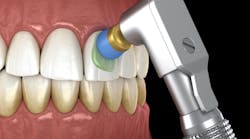The power of disconnecting: Finding peace in a hyperconnected world
Listen to the article on our podcast!
As I stare out the window of a 747 on my way to a conference, I have my AirPods Max set to noise cancellation with nothing playing—just the sweet sound of (almost) silence. “I’m not here to talk” may as well be written on my forehead. It’s been an intense year for many—politically, for sure, but also within our profession. I’ve personally muttered, “I just can’t internet today,” on more than one occasion, feeling the tension and divisiveness online. And I know I’m not alone.
As dental hygienists, we carry the weight of stress both physically and emotionally. The constant mental strain, combined with the physical demands of precision-dependent dental hygiene, often begs for a lunchtime nap or a weekly massage. We feel the toll in our bodies: stress hormones like cortisol are released, heart rate elevates, muscles tense, digestion is interrupted, and headaches creep in.1
Others have spoken out about the emotional toll our profession takes, often labeling it burnout.2,3 But are we truly burnt out on dental hygiene—or simply experiencing social fatigue from overstimulation in our always-on world?
Are you overstimulated?
Even extroverts like me—who thrive on human interaction—are feeling the drain. The constant pings and notifications, the unrelenting pressure to monitor everything from sleep quality to how many rings we’ve sealed on our watches—it’s exhausting.
We give everything we have mentally, physically, and emotionally until a depleted version of ourselves emerges: resentful, intolerant, and irritated. Eventually, we silently admit, “It’s time to disconnect.” That’s when we plunge into self-care like a Gracey in a 9mm pocket, hoping to debride the distractions and uncover a healthier version of ourselves.
But while chocolates, bubble baths, and rom-coms feel good in the moment, they’re often just band-aids. The real culprit may be something bigger: technology-induced overstimulation and connectivity overload.
Digital detox: More than a trend
Maybe it’s time to treat intentional disconnection as a preventative practice. Research increasingly links social media overuse to mental health decline, poor concentration, and reduced workplace productivity.4,5
Start by evaluating your digital diet. If certain accounts or online communities trigger negative feelings, reduce your exposure and note how your mood shifts. Getting pulled into professional drama online can stick to your brain like tenacious calculus.
Try scheduling screen-free time or days—what some call a “digital detox.” Even extended breaks from social media have been shown to improve happiness.6 Author Cal Newport recommends in Deep Work that rather than depriving ourselves of social media, we schedule designated time for it.7 That way, we can be more present the rest of the day, knowing we’ve carved out time to scroll later.
Personally, I started by turning off all app notifications except for texts and phone calls. Game changer!
Nature is a natural reset
Speaking of being present, try spending more time outdoors. Just a quick lunchtime walk in nature can boost sleep quality, enhance immunity, rev up metabolism, and elevate mood through vitamin D and serotonin.8 Let the birdsong replace your morning emails and give your senses a break.
Solo activities like cycling, running, or weight training offer similar benefits. They force us to focus on the present: the next breath, the next rep, the next step—not what’s sitting unread in our inboxes.
Breath and balance: The parasympathetic reset
If you're looking for a more immediate way to unwind, consider slow, deep breathing exercises. These practices stimulate the parasympathetic nervous system, which helps lower blood pressure and reduce anxiety.9,10 Yoga isn’t just about downward dogs—it includes breathwork techniques known to reduce stress and calm the mind.
Meditation: There’s no one way
Meditation looks different for everyone. According to the Mayo Clinic, it’s about clearing the mental clutter to achieve calm, peace, and balance.11 For some, it’s prayer or scripture. For others, it’s guided meditation or simply focusing on the rhythm of their breath.
Intentional disconnection is the new self-care
Regardless of how we choose to disconnect, what matters is that we do. Whether it's built into daily routines or a dedicated break away from the noise, intentional disconnection helps restore mental clarity and emotional balance.
So go for that walk on your lunch break. Practice deep breathing. Leave your phone behind. These small acts can ripple outward and lead to real inner peace in an overstimulated world.
Editor's note: This article appeared in the June 2025 print edition of RDH magazine. Dental hygienists in North America are eligible for a complimentary print subscription. Sign up here.
References
- Chu B, Marwaha K, Sanvictores T, et al. Physiology, Stress Reaction. In: StatPearls [Internet]. Treasure Island (FL): StatPearls Publishing; 2025 Jan–. Updated 2024 May 7. https://www.ncbi.nlm.nih.gov/books/NBK541120/
- Barnard SA, Alexander BA, Lockett AK, et al. Mental health and self-care practices among dental hygienists. J Dent Hyg. 2020;94(4):22-28. PMID: 32753521.
- Malcolm N, Boyd L, Giblin-Scanlon L, Vineyard J. Occupational stressors of dental hygienists in the United States. Work. 2020;65(3):517-524. doi:10.3233/WOR-203106. PMID: 32116271.
- Shannon H, Montgomery M, Guimond S, Hellemans K. Problematic social media use and inhibitory control among post-secondary students. Addict Behav. 2025;165:108307. doi:10.1016/j.addbeh.2025.108307. PMID: 40020458.
- Ahmed E, Vaghefi I. Social media addiction: A systematic review through cognitive-behavior model of pathological use. In: Proceedings of the 54th Hawaii International Conference on System Sciences; January 2021. doi:10.24251/HICSS.2021.802.
- Tromholt M. The Facebook experiment: Quitting Facebook leads to higher levels of well-being. Cyberpsychol Behav Soc Netw. 2016;19(11):661-666. doi:10.1089/cyber.2016.0259. PMID: 27831756.
- Newport C. Deep Work: Rules for Focused Success in a Distracted World. New York: Hachette; 2016.
- Twohig-Bennett C, Jones A. The health benefits of the great outdoors: A systematic review and meta-analysis of greenspace exposure and health outcomes. Environ Res. 2018;166:628-637. doi:10.1016/j.envres.2018.06.030. PMID: 29982151; PMCID: PMC6562165.
- Jerath R, Edry JW, Barnes VA, Jerath V. Physiology of long pranayamic breathing: Neural respiratory elements may provide a mechanism that explains how slow deep breathing shifts the autonomic nervous system. Med Hypotheses. 2006;67(3):566-571. doi:10.1016/j.mehy.2006.02.042. PMID: 16624497.
- Herawati I, Mat Ludin AF, M M, Ishak I, Farah NMF. Breathing exercise for hypertensive patients: A scoping review. Front Physiol. 2023;14:1048338. doi:10.3389/fphys.2023.1048338. PMID: 36760529; PMCID: PMC9905130.
- Mayo Clinic. Meditation: A fast, simple way to reduce stress. Accessed February 28, 2025. https://www.mayoclinic.org/tests-procedures/meditation/in-depth/meditation/art-20045858
About the Author

Katrina Klein, RDH, CEAS, CPT
Katrina is an 18-year registered dental hygienist, national speaker, author, competitive bodybuilder, certified personal trainer, certified ergonomic assessment specialist, and biomechanics nerd. She’s the founder of ErgoFitLife, where she teaches that ergonomics and fitness are a lifestyle to prevent, reduce, and even eliminate workplace pain. You can reach Katrina at [email protected].


